SEO
The Future Of WordPress With Josepha Haden Chomphosy

This year, at WordCamp Porto, I had an opportunity to interview Josepha Haden Chomphosy, Executive Directory of WordPress.
She gave us some very in-depth answers about what is happening in the world of WordPress, and what we can expect in the future from the top CMS.
WordPress powers nearly half of the web. What challenges does WordPress face as a CMS in the coming year and how does it plan to overcome them?
Chomphosy: “WordPress in the next year. One of the biggest difficulties we face in general is the fact that we are rewriting our entire codebase as we also continue to move forward as a functioning piece of software.
In a lot of cases, you would see a software stop every contribution from their community and rebuild everything while no one else is in it and just kind of use a closed model of re-envisioning how their software would work.
We are five years into this probably ten-year project and so the next year as with all of the years in a project like that is making sure we are still as stable and capable as a CMS as people have come to expect while also still pushing forward with a newer more modern way to manage your content online.
No big deal, Small problems.”
I know about Matt’s “Five for the Future” initiative which aims to solve the challenges of supporting WordPress as it grows. How do you see that working? Do you see enough response rates from the community?
Chomphosy: “The Five for the Future program initiative has been around since 2014, so quite a while. It wasn’t until 2016 or 2017 that we had a more codified program around it where people could pledge their time to specific teams and those teams would know we have some volunteer work that we can send to people and we can see the people who are interested in doing that kind of contribution.
It funds the project from a time perspective so that it’s easy for individual contributors to say what they are interested in it’s easier for contributor teams to see who is interested in them and recently, we also have expanded that program to include what’s considered a Five for the Future team.
I think that major corporations in the WordPress ecosystem should give back substantially to the WordPress project, especially if they make a substantial amount of money or revenue using WordPress.
Overall I would say that we have had a good response from both our community of contributors and our economic partners in the ecosystem. I do think we’ve had a good response, but we can always use more.
The WordPress CMS is used all over the place and is maintained by less than 1% of the people who get a benefit from that and people in corporations who get a benefit from that and so I always want more people to be involved and responding, but we do have good response to it.”
Do you foresee any changes like WordPress becoming paid, for example?
Chomphosy: “It’s hard to predict the future, but I don’t see any way for that to happen, no.
Free open-source software I’m sure you know but many people get confused about whether that means it’s free as in not any money or free as in provides freedom to people.
We like to remind everyone all the time that it’s free as in freedom to people, but also making the software freely available is incredibly important to WordPress. So I can’t see a future where we’d be like just kidding, pay for licenses.”
What’s going to make WordPress continue to stand out/above its peers and competitors? How is WordPress future-proofing?
Chomphosy: “I think that the thing that makes WordPress as a project stands out from its competitors is the strength of the community that’s around us and interestingly enough the thing that makes our community stand out compared to other open-source projects that also have communities is our in-person event series and so not having those for the last two and a half years certainly has been a struggle for us.
And so this flagship event is the first in-person flagship event since we had to cancel WordCamp Asia in 2020 and we’re very excited to have everyone back together.
There were 800 people at the contributor day and that is the biggest contributor day at a flagship event that we’ve ever had. And so you can see in not only the number of people who are coming to this event but also in the number of people who showed up to learn how to give back to WordPress, the project, the CMS, and the ecosystem. The strength of what we are and how we will sustain ourselves into the future lies in that group of people that just wants to be here and continuing to make it better.
I think that’s how we set ourselves apart and also from a future-proofing standpoint, in the way that we invest in those contributors the way that we bring them into the space and how they can make it better if that’s what they want. I hope that’s what they want. That is certainly how we’re future-proofing things.
A little side note from a leadership perspective. It’s always important for me to look at how we can make sure the organization outlasts anyone who’s leading right now. Outlasts me, outlasts Matt. Because everyone is one just catastrophic event away from not being able to do what they used to do.
That’s always a very important part of this for me. I’m constantly training people who are with us in this work toward WordPress. I’m always training them to do what I know how to do because it’s never appropriate for me to be the only person who knows how to do anything that is vital to WordPress’s success.”
The CMS market becomes competitive day by day. Do you see a decline in WordPress’s market share or it is growing?
Chomphosy: “There was, in the WordPress community recently, a bit of a discussion about W3Tech’s market share and usage numbers. There was a small decline. It’s publicly available and we had discussions around it. There’s no point in saying there wasn’t a decline there.
However, I don’t think that there’s anything to be worried about. With W3Techs, as they are working toward deprecating one of its major datasets, it will always change what we’re seeing there. We can’t be sure what they’re doing and not doing, it’s very closed, very proprietary.
In the grand scheme of things, it’s basically level at the moment as far as I’m concerned there.”
There were complaints from users that WordPress by the introduction of full site editing now does change too frequently and drastically and they now have to spend a lot of time/resources to learn it again and fix broken parts of websites when it was used to work for them just great. What will be your message to those users?
Chomphosy: “I know that it is frustrating to have to relearn something that you spent so much time learning, but that is the way that we have chosen to do that rework of WordPress as kind of a phased evolution over time as opposed to a single point of a revolution was so that people could learn gradually over time based on what they found in small places.
As we make the editing interfaces of the CMS more and more similar they’ll only have to learn they can use the same type of user flow, the same type of interaction pattern across the CMS and so the basic understanding of all of the mechanisms should start to translate into the rest of the CMS as well.
Every open-source software builds everything in public and it is people who are telling us, “This is hard to learn. This is hard for me to use.”
It’s that sort of feedback that helps us to make it better, but it has been for many, many people seeing full site editing right now, a long time since WordPress do such big changes in public, but I wouldn’t say it’s necessarily faster than we expected.
If you’re following the beta and in the plugin, you get a new release in every two weeks, but if you’re not following the beta and the plugin, you get three releases a year and that is, I think, a pretty fast pace, but tolerable as well if you are keeping track as you go.
So I guess my message is to make sure that you don’t just wait until every ten releases to update because then you are going to have a lot that you do to have to learn.”
There are classic editor plugins which is around for those who do want to use the old style of WordPress. Do you think the plugins are going to be maintained for a long time? Do you think you will deprecate them?
Chomphosy: “We have been taking that year by year as we see people’s need for it and as we end up with something much more robust in the CMS itself.
I don’t see any future where we just remove it from the repo or any of the directories. I don’t think we’re planning on deprecating it and having it be gone forever. But it is always better to try to keep up with things as it’s coming out slowly so you are not overwhelmed by all of the things at one go.”
How do you decide what features to ship in new versions? What the process looks like?
Chomphosy: “That’s all a very public process. Fortunately, we get by with a little help from our friends on that one.
So we have core chats every week and every major component most major components inside core have public chats where people talk about the tickets they’re working on, the features they are working on, the bugs they can’t quite solve, and prioritize based on what is the most impactful for users and what is feasible based on the timeframe we’re working on for any given release.
The decision is based on what is ready at that moment, but also certainly but also what the general impact is.”
What is one major fix you would like to see WordPress make?
Chomphosy: “Our next big need is to focus a lot on the menus and navigation, and that is a very complicated thing. That is hard even in the best of moments. No one would disagree that spending a lot of time on that and getting a good solid fix that is user tested and approved is the right way to head next.”
Almost all WordPress users complain about built-in internal search. Do you have plans to improve it? For example giving website owners decide which articles to exclude from search, or adding customizable search indexing weighing factors?
Chomphosy: “The short answer is yes there are thoughts around how to fix it and there is a lot of research that is being done by contributors.
I don’t think that anyone has found a solution that we all agree is as functional as we want it to be while also being as elegant and performant as we need it to be. We have not figured out what the proper solution is to that. But yes absolutely it is something the community discusses frequently and does ongoing research on.”
Gutenberg has Full Site Editing (FSE) but Gutenberg is said to still be in Beta. Is there an ETA for that label coming off?
Chomphosy: “I don’t know that there is an ETA for it coming off. It is true that in the WordPress project we use those terms of it differently just like we do sequential ordering as opposed to semantic versioning.
It’s beta in that it is going to keep moving and iterating, it’s not beta in that it is unstable. It will be in beta at least through the current phase, but not because it’s generally dangerous to use. Just because it will change frequently.”
I think it’s fantastic that WordPress has a performance team working on improving the core so that it has fast performance. But no matter how fast you make the core, it seems like all it takes is a sloppy theme to undo all the good work that the core had put into it. So it seems like the next step is to get theme and plugin developers on board. Is that something on the horizon?
Chomphosy: “Themes are particular. Themes are essentially a core issue.
I have not run into many people in the world, many users in the world who feel like their theme was not WordPress. No one has got WordPress the CMS and then also a theme and they think, “I had a bad experience theme, I’ll switch out that theme.”
I shouldn’t say no one, but regardless, themes are considered such an inextricable part of WordPress that we have to consider them almost as a part of the core sometimes. And so do we want themes and plugins to also make some effort around performance, yes absolutely. But do we have any rules in place at the moment? Not really.
Themes has been undergoing a bit of a transformation along with the core because we have offered new functionality, and we’re trying to reshuffle whether you’ve got functionality or just the visual representations in themes. As that moves forward, probably we will have to move forward with some of the ways we guide all of the contributors.
That’s true for plugins as well as features in plugins kind of move with the way core is able to support them in that it makes sense that we would have to have some sort of refreshed guidelines down the road. But at the moment, no one is discussing them because they’re still trying to figure out how to make everything work well with Gutenberg.”
Do you have plans to introduce badges like WordPress certified? Like team developers can get those by passing a test or an interview process with the WordPress core team got those pages and whenever they are developing have those badges in place so everyone knows that those teams really have skills like the WordPress core team. Like Google Certified Partners, but Certified WordPress Developers.
Chomphosy: “It’s interesting that you ask because questions of certifications are coming up in the community right now. I’ve had so many conversations with attendees at this particular WordCamp. It’s on everyone’s mind.
Historically we’ve never offered any certifications. The logistics of it are hard. The documentation we have is not always easy to keep up to date. There were some logistical hurdles to it, there were some philosophical questions around open source and certifications and what that would mean for how we could help our community stay together with each other through their learning and through improving the CMS.
The conversation has come back up because we have started to provide some training via leran.wordpress.org. It’s getting more and more true that you can get a lot of information that you need about how to use the WordPress CMS not only through written documentation but now also through workshops and social learning spaces.
As we are providing more of that, the question of how we can give some indication that people went through those workshops and went through those training and succeeded at them. So it’s a new old question back on the table.”
The Redirection plugin is installed on over 2 million websites. Clearly, there’s a need for that, so is there any chance that a redirection function similar to the plugin will be integrated into the core and if not, why not? Does it bump up against WP’s goal of keeping it simple for everyone to use?
Chomphosy: “I don’t think that better native features and functionality ever make WordPress hard to use it shouldn’t and if it does we shouldn’t put it in there. But there is currently not a discussion about that.
There is a feature plugin proposal process where people can say that this plugin is basically used everywhere we would like to propose that we find a way for it to be included in core. No one has brought that up. No one has brought that to the table.
I was talking to the performance working group about that yesterday. Not about that particular plugin, but about the feature plugin approval process. The documentation around that needs some updating, but it’s certainly a thing we have always done in the WordPress project and would be the first step in including something like that in the core.”
Conclusion
We hope you’ve enjoyed these insights into the current and future plans for WordPress. Remember that the WordPress project continues to improve based on the contributions of its users. Be sure to learn more about the many ways you can contribute to and give back to the WordPress community.
For more on WordPress from WordCamp Porto, don’t miss our interview with Ivan Popov of Vipe Studio on Headless WordPress SEO.
Featured Image: monticello/Shutterstock
SEO
An In-Depth Guide And Best Practices For Mobile SEO
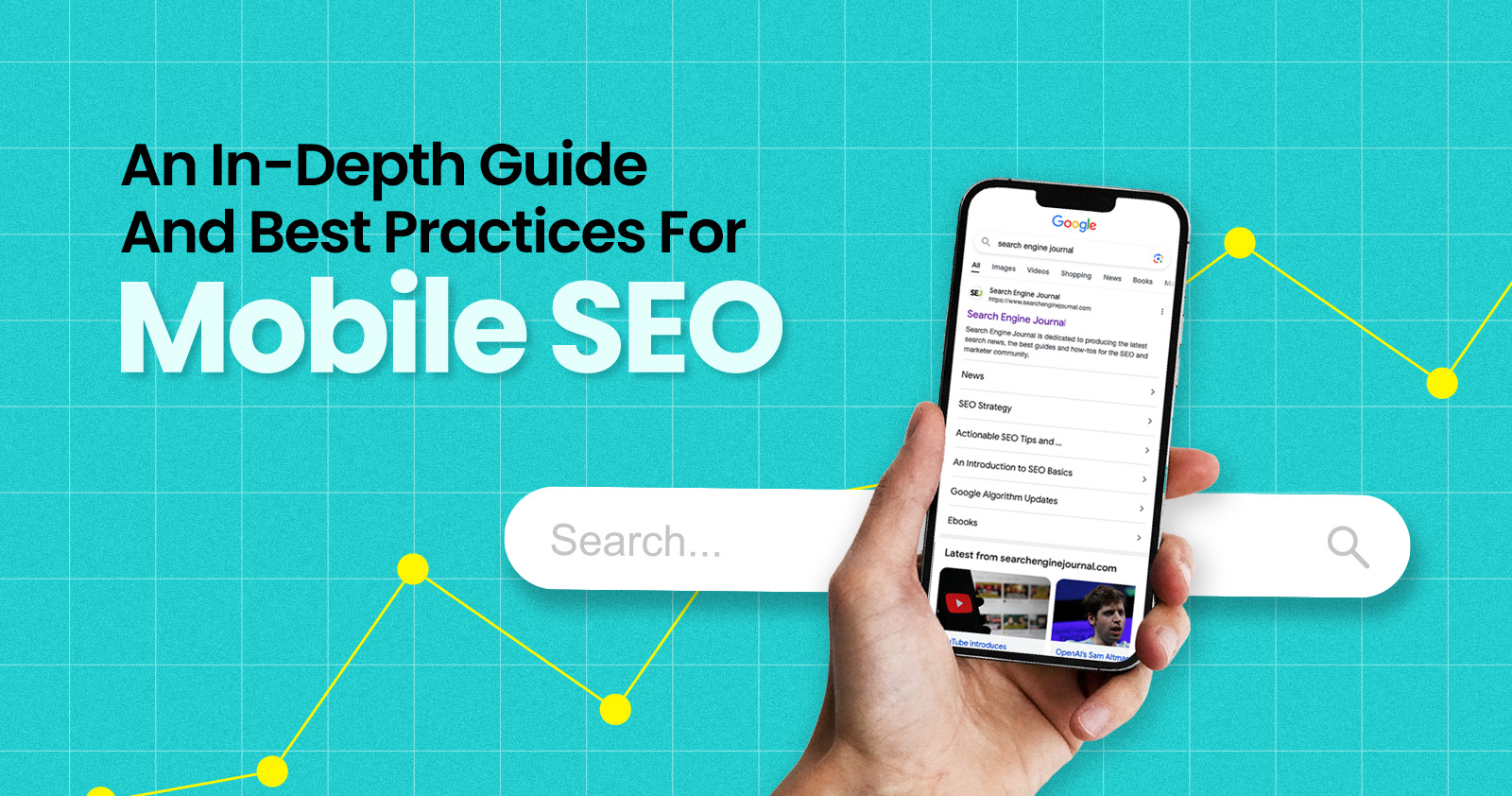
Over the years, search engines have encouraged businesses to improve mobile experience on their websites. More than 60% of web traffic comes from mobile, and in some cases based on the industry, mobile traffic can reach up to 90%.
Since Google has completed its switch to mobile-first indexing, the question is no longer “if” your website should be optimized for mobile, but how well it is adapted to meet these criteria. A new challenge has emerged for SEO professionals with the introduction of Interaction to Next Paint (INP), which replaced First Input Delay (FID) starting March, 12 2024.
Thus, understanding mobile SEO’s latest advancements, especially with the shift to INP, is crucial. This guide offers practical steps to optimize your site effectively for today’s mobile-focused SEO requirements.
What Is Mobile SEO And Why Is It Important?
The goal of mobile SEO is to optimize your website to attain better visibility in search engine results specifically tailored for mobile devices.
This form of SEO not only aims to boost search engine rankings, but also prioritizes enhancing mobile user experience through both content and technology.
While, in many ways, mobile SEO and traditional SEO share similar practices, additional steps related to site rendering and content are required to meet the needs of mobile users and the speed requirements of mobile devices.
Does this need to be a priority for your website? How urgent is it?
Consider this: 58% of the world’s web traffic comes from mobile devices.
If you aren’t focused on mobile users, there is a good chance you’re missing out on a tremendous amount of traffic.
Mobile-First Indexing
Additionally, as of 2023, Google has switched its crawlers to a mobile-first indexing priority.
This means that the mobile experience of your site is critical to maintaining efficient indexing, which is the step before ranking algorithms come into play.
Read more: Where We Are Today With Google’s Mobile-First Index
How Much Of Your Traffic Is From Mobile?
How much traffic potential you have with mobile users can depend on various factors, including your industry (B2B sites might attract primarily desktop users, for example) and the search intent your content addresses (users might prefer desktop for larger purchases, for example).
Regardless of where your industry and the search intent of your users might be, the future will demand that you optimize your site experience for mobile devices.
How can you assess your current mix of mobile vs. desktop users?
An easy way to see what percentage of your users is on mobile is to go into Google Analytics 4.
- Click Reports in the left column.
- Click on the Insights icon on the right side of the screen.
- Scroll down to Suggested Questions and click on it.
- Click on Technology.
- Click on Top Device model by Users.
- Then click on Top Device category by Users under Related Results.
- The breakdown of Top Device category will match the date range selected at the top of GA4.
You can also set up a report in Looker Studio.
- Add your site to the Data source.
- Add Device category to the Dimension field.
- Add 30-day active users to the Metric field.
- Click on Chart to select the view that works best for you.
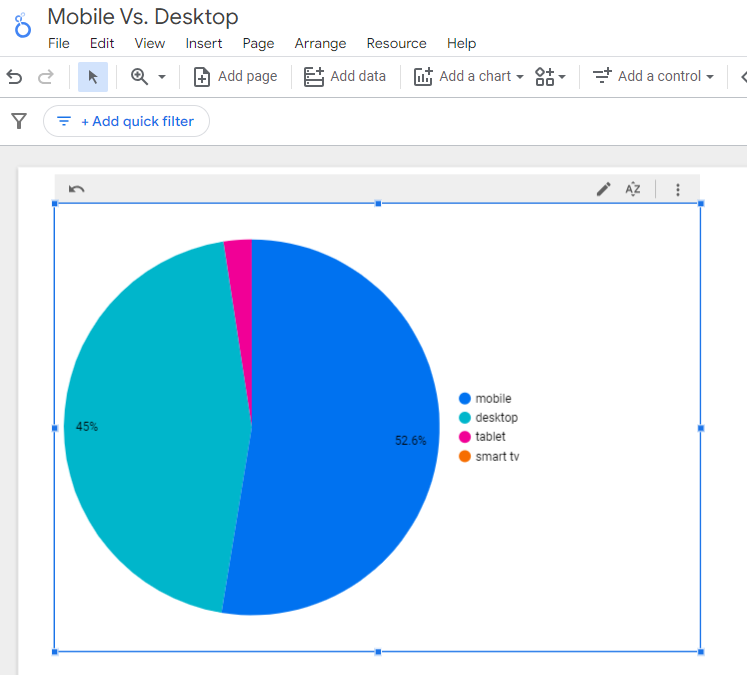 Screenshot from Looker Studio, March 2024
Screenshot from Looker Studio, March 2024You can add more Dimensions to really dig into the data to see which pages attract which type of users, what the mobile-to-desktop mix is by country, which search engines send the most mobile users, and so much more.
Read more: Why Mobile And Desktop Rankings Are Different
How To Check If Your Site Is Mobile-Friendly
Now that you know how to build a report on mobile and desktop usage, you need to figure out if your site is optimized for mobile traffic.
While Google removed the mobile-friendly testing tool from Google Search Console in December 2023, there are still a number of useful tools for evaluating your site for mobile users.
Bing still has a mobile-friendly testing tool that will tell you the following:
- Viewport is configured correctly.
- Page content fits device width.
- Text on the page is readable.
- Links and tap targets are sufficiently large and touch-friendly.
- Any other issues detected.
Google’s Lighthouse Chrome extension provides you with an evaluation of your site’s performance across several factors, including load times, accessibility, and SEO.
To use, install the Lighthouse Chrome extension.
- Go to your website in your browser.
- Click on the orange lighthouse icon in your browser’s address bar.
- Click Generate Report.
- A new tab will open and display your scores once the evaluation is complete.
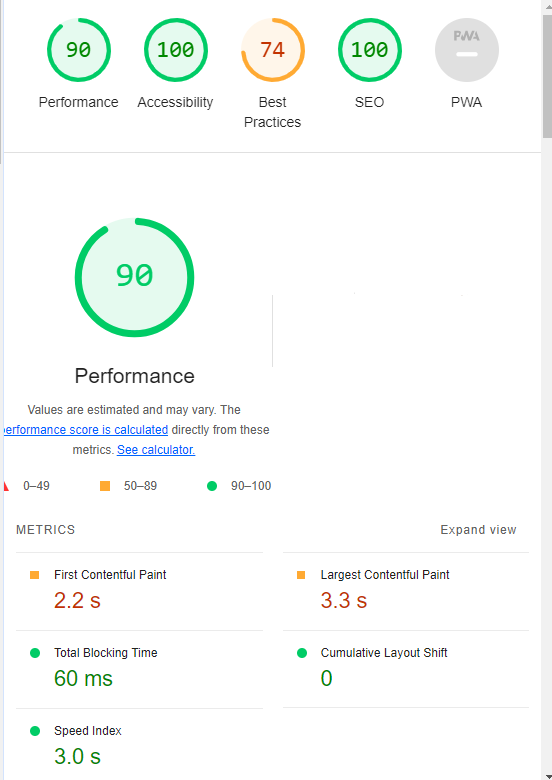 Screenshot from Lighthouse, March 2024
Screenshot from Lighthouse, March 2024You can also use the Lighthouse report in Developer Tools in Chrome.
- Simply click on the three dots next to the address bar.
- Select “More Tools.”
- Select Developer Tools.
- Click on the Lighthouse tab.
- Choose “Mobile” and click the “Analyze page load” button.
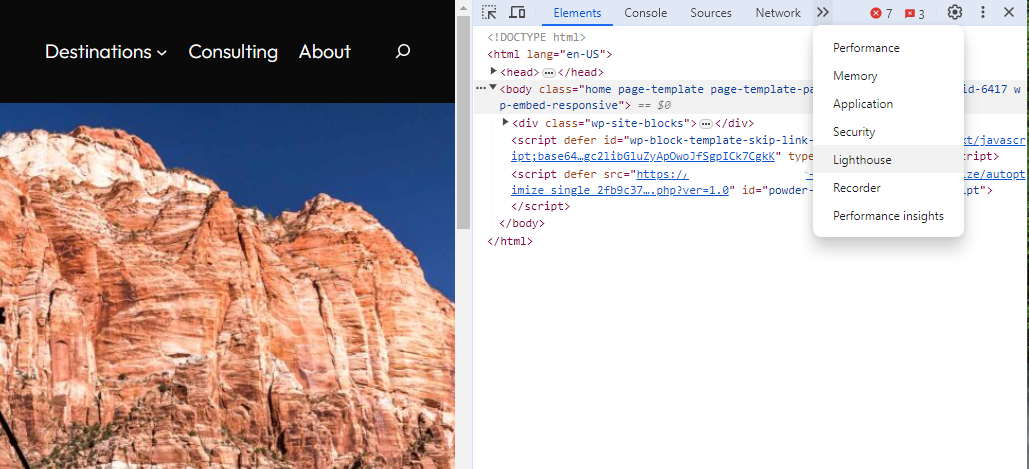 Screenshot from Lighthouse, March 2024
Screenshot from Lighthouse, March 2024Another option that Google offers is the PageSpeed Insights (PSI) tool. Simply add your URL into the field and click Analyze.
PSI will integrate any Core Web Vitals scores into the resulting view so you can see what your users are experiencing when they come to your site.
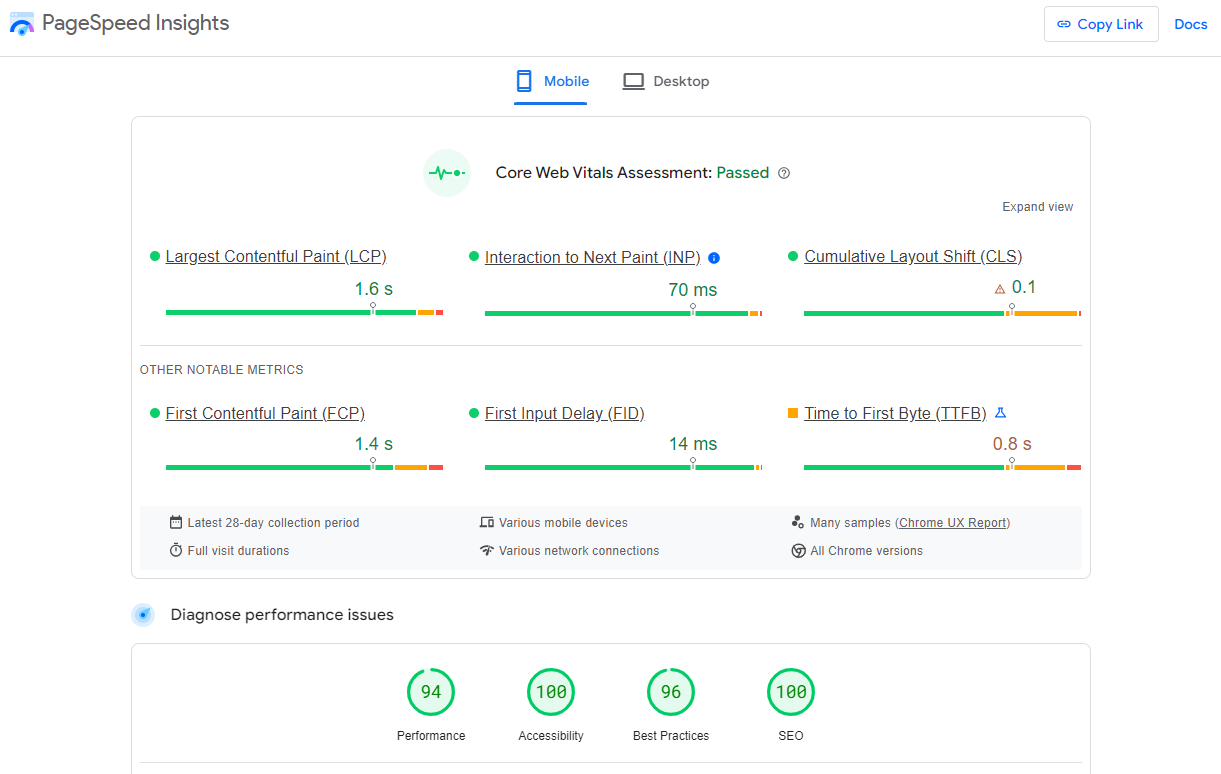 Screenshot from PageSpeed Insights, March 2024
Screenshot from PageSpeed Insights, March 2024Other tools, like WebPageTest.org, will graphically display the processes and load times for everything it takes to display your webpages.
With this information, you can see which processes block the loading of your pages, which ones take the longest to load, and how this affects your overall page load times.
You can also emulate the mobile experience by using Developer Tools in Chrome, which allows you to switch back and forth between a desktop and mobile experience.
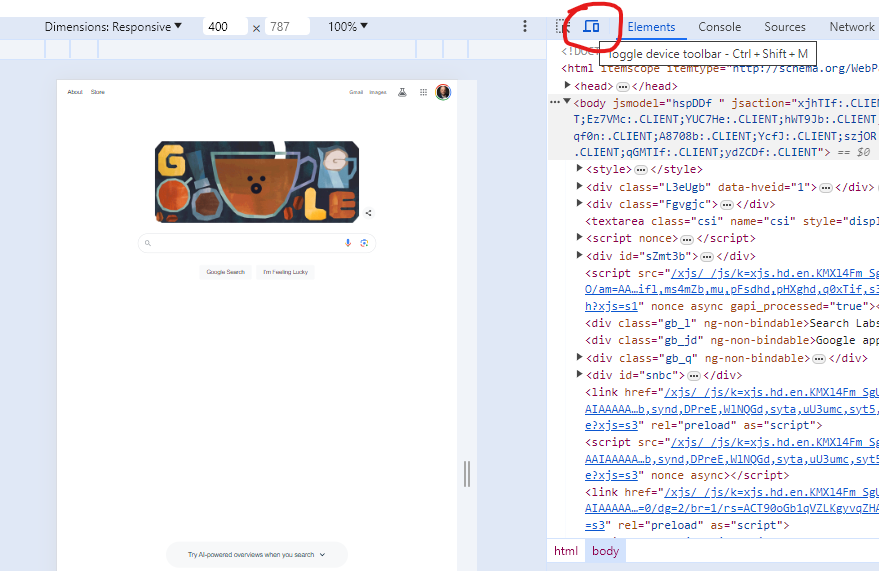 Screenshot from Google Chrome Developer Tools, March 2024
Screenshot from Google Chrome Developer Tools, March 2024Lastly, use your own mobile device to load and navigate your website:
- Does it take forever to load?
- Are you able to navigate your site to find the most important information?
- Is it easy to add something to cart?
- Can you read the text?
Read more: Google PageSpeed Insights Reports: A Technical Guide
How To Optimize Your Site Mobile-First
With all these tools, keep an eye on the Performance and Accessibility scores, as these directly affect mobile users.
Expand each section within the PageSpeed Insights report to see what elements are affecting your score.
These sections can give your developers their marching orders for optimizing the mobile experience.
While mobile speeds for cellular networks have steadily improved around the world (the average speed in the U.S. has jumped to 27.06 Mbps from 11.14 Mbps in just eight years), speed and usability for mobile users are at a premium.
Read more: Top 7 SEO Benefits Of Responsive Web Design
Best Practices For Mobile Optimization
Unlike traditional SEO, which can focus heavily on ensuring that you are using the language of your users as it relates to the intersection of your products/services and their needs, optimizing for mobile SEO can seem very technical SEO-heavy.
While you still need to be focused on matching your content with the needs of the user, mobile search optimization will require the aid of your developers and designers to be fully effective.
Below are several key factors in mobile SEO to keep in mind as you’re optimizing your site.
Site Rendering
How your site responds to different devices is one of the most important elements in mobile SEO.
The two most common approaches to this are responsive design and dynamic serving.
Responsive design is the most common of the two options.
Using your site’s cascading style sheets (CSS) and flexible layouts, as well as responsive content delivery networks (CDN) and modern image file types, responsive design allows your site to adjust to a variety of screen sizes, orientations, and resolutions.
With the responsive design, elements on the page adjust in size and location based on the size of the screen.
You can simply resize the window of your desktop browser and see how this works.
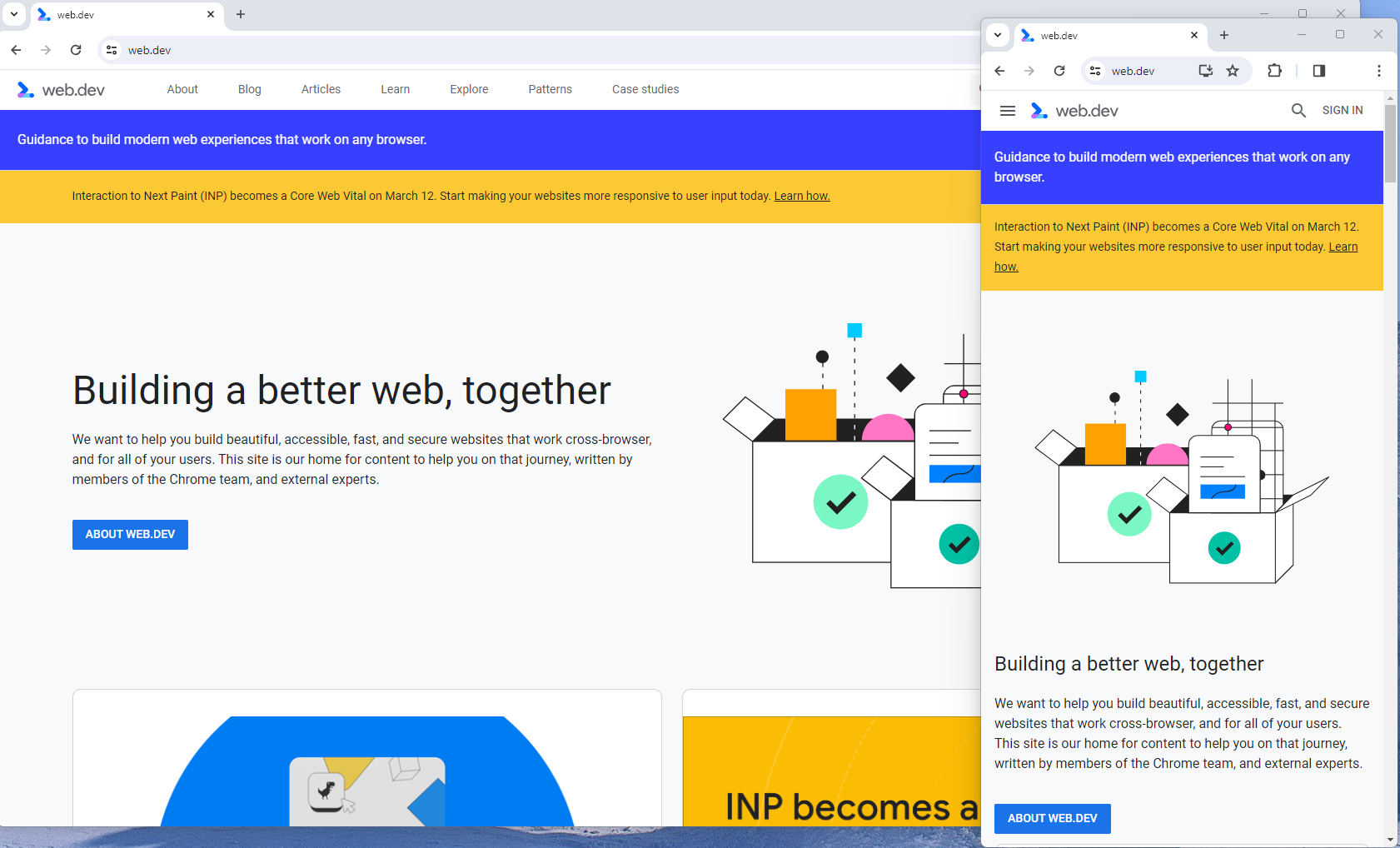 Screenshot from web.dev, March 2024
Screenshot from web.dev, March 2024This is the approach that Google recommends.
Adaptive design, also known as dynamic serving, consists of multiple fixed layouts that are dynamically served to the user based on their device.
Sites can have a separate layout for desktop, smartphone, and tablet users. Each design can be modified to remove functionality that may not make sense for certain device types.
This is a less efficient approach, but it does give sites more control over what each device sees.
While these will not be covered here, two other options:
- Progressive Web Apps (PWA), which can seamlessly integrate into a mobile app.
- Separate mobile site/URL (which is no longer recommended).
Read more: An Introduction To Rendering For SEO
Interaction to Next Paint (INP)
Google has introduced Interaction to Next Paint (INP) as a more comprehensive measure of user experience, succeeding First Input Delay. While FID measures the time from when a user first interacts with your page (e.g., clicking a link, tapping a button) to the time when the browser is actually able to begin processing event handlers in response to that interaction. INP, on the other hand, broadens the scope by measuring the responsiveness of a website throughout the entire lifespan of a page, not just first interaction.
Note that actions such as hovering and scrolling do not influence INP, however, keyboard-driven scrolling or navigational actions are considered keystrokes that may activate events measured by INP but not scrolling which is happeing due to interaction.
Scrolling may indirectly affect INP, for example in scenarios where users scroll through content, and additional content is lazy-loaded from the API. While the act of scrolling itself isn’t included in the INP calculation, the processing, necessary for loading additional content, can create contention on the main thread, thereby increasing interaction latency and adversely affecting the INP score.
What qualifies as an optimal INP score?
- An INP under 200ms indicates good responsiveness.
- Between 200ms and 500ms needs improvement.
- Over 500ms means page has poor responsiveness.
and these are common issues causing poor INP scores:
- Long JavaScript Tasks: Heavy JavaScript execution can block the main thread, delaying the browser’s ability to respond to user interactions. Thus break long JS tasks into smaller chunks by using scheduler API.
- Large DOM (HTML) Size: A large DOM ( starting from 1500 elements) can severely impact a website’s interactive performance. Every additional DOM element increases the work required to render pages and respond to user interactions.
- Inefficient Event Callbacks: Event handlers that execute lengthy or complex operations can significantly affect INP scores. Poorly optimized callbacks attached to user interactions, like clicks, keypress or taps, can block the main thread, delaying the browser’s ability to render visual feedback promptly. For example when handlers perform heavy computations or initiate synchronous network requests such on clicks.
and you can troubleshoot INP issues using free and paid tools.
As a good starting point I would recommend to check your INP scores by geos via treo.sh which will give you a great high level insights where you struggle with most.
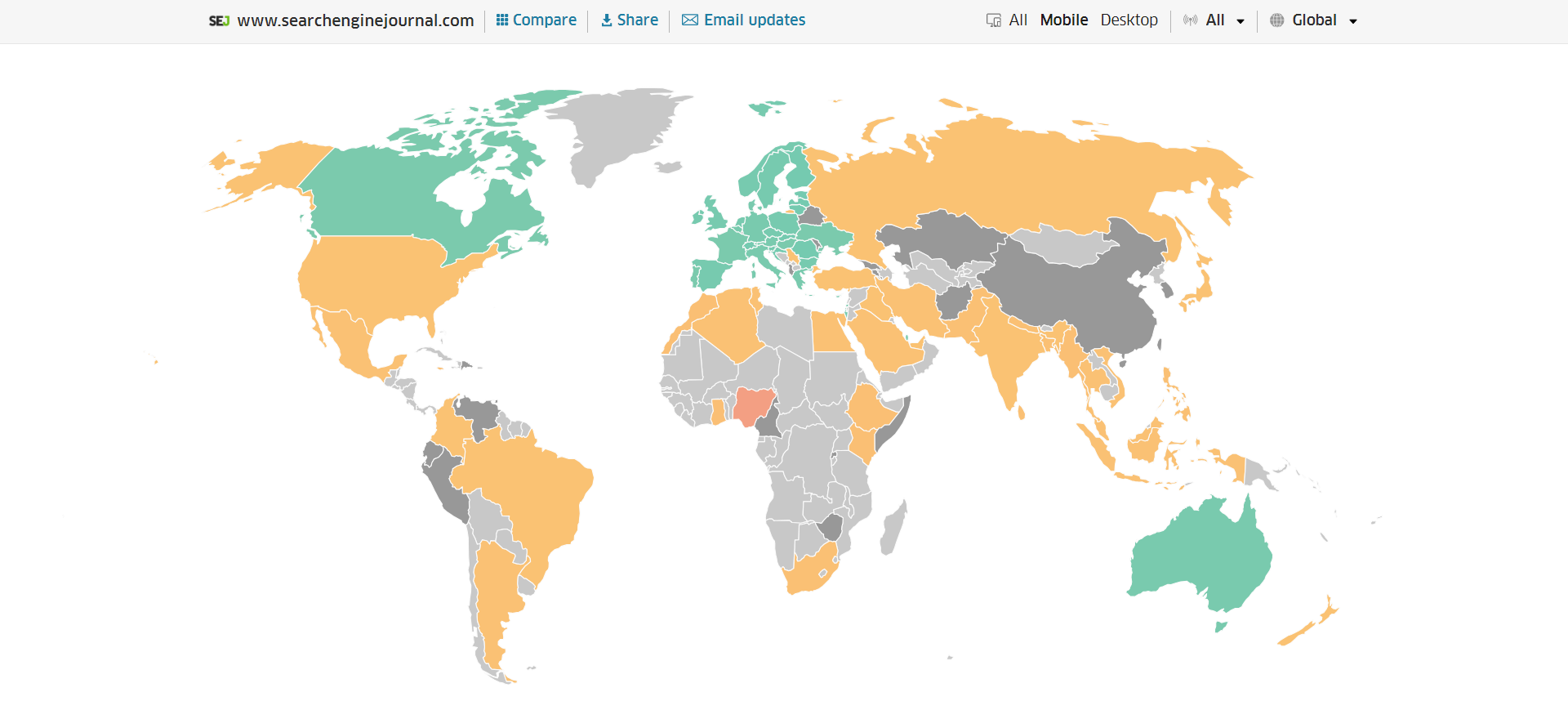 INP scores by Geos
INP scores by GeosRead more: How To Improve Interaction To Next Paint (INP)
Image Optimization
Images add a lot of value to the content on your site and can greatly affect the user experience.
From page speeds to image quality, you could adversely affect the user experience if you haven’t optimized your images.
This is especially true for the mobile experience. Images need to adjust to smaller screens, varying resolutions, and screen orientation.
- Use responsive images
- Implement lazy loading
- Compress your images (use WebP)
- Add your images into sitemap
Optimizing images is an entire science, and I advise you to read our comprehensive guide on image SEO how to implement the mentioned recommendations.
Avoid Intrusive Interstitials
Google rarely uses concrete language to state that something is a ranking factor or will result in a penalty, so you know it means business about intrusive interstitials in the mobile experience.
Intrusive interstitials are basically pop-ups on a page that prevent the user from seeing content on the page.
John Mueller, Google’s Senior Search Analyst, stated that they are specifically interested in the first interaction a user has after clicking on a search result.

Not all pop-ups are considered bad. Interstitial types that are considered “intrusive” by Google include:
- Pop-ups that cover most or all of the page content.
- Non-responsive interstitials or pop-ups that are impossible for mobile users to close.
- Pop-ups that are not triggered by a user action, such as a scroll or a click.
Read more: 7 Tips To Keep Pop-Ups From Harming Your SEO
Structured Data
Most of the tips provided in this guide so far are focused on usability and speed and have an additive effect, but there are changes that can directly influence how your site appears in mobile search results.
Search engine results pages (SERPs) haven’t been the “10 blue links” in a very long time.
They now reflect the diversity of search intent, showing a variety of different sections to meet the needs of users. Local Pack, shopping listing ads, video content, and more dominate the mobile search experience.
As a result, it’s more important than ever to provide structured data markup to the search engines, so they can display rich results for users.
In this example, you can see that both Zojirushi and Amazon have included structured data for their rice cookers, and Google is displaying rich results for both.
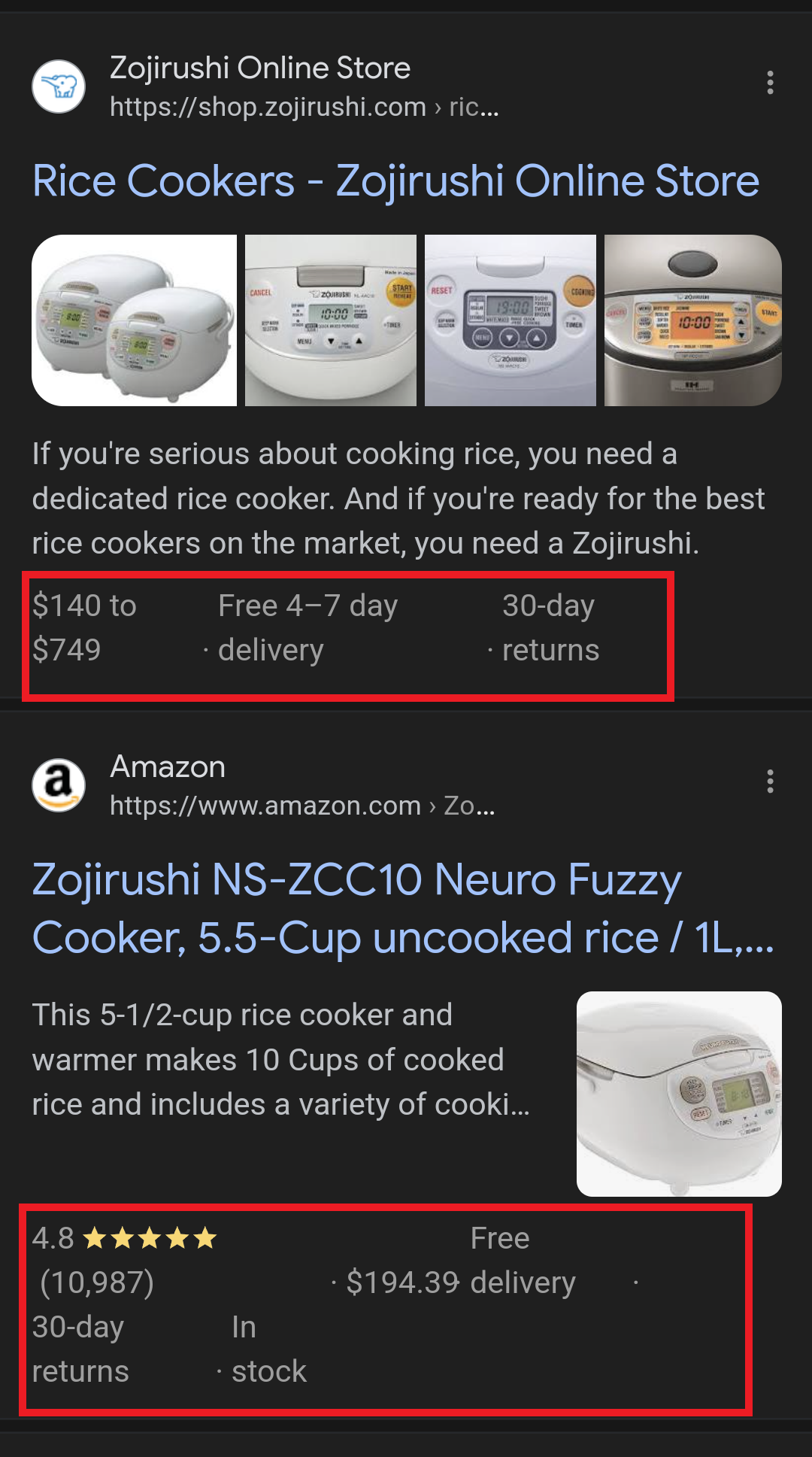 Screenshot from search for [Japanese rice cookers], Google, March 2024
Screenshot from search for [Japanese rice cookers], Google, March 2024Adding structured data markup to your site can influence how well your site shows up for local searches and product-related searches.
Using JSON-LD, you can mark up the business, product, and services data on your pages in Schema markup.
If you use WordPress as the content management system for your site, there are several plugins available that will automatically mark up your content with structured data.
Read more: What Structured Data To Use And Where To Use It?
Content Style
When you think about your mobile users and the screens on their devices, this can greatly influence how you write your content.
Rather than long, detailed paragraphs, mobile users prefer concise writing styles for mobile reading.
Each key point in your content should be a single line of text that easily fits on a mobile screen.
Your font sizes should adjust to the screen’s resolution to avoid eye strain for your users.
If possible, allow for a dark or dim mode for your site to further reduce eye strain.
Headers should be concise and address the searcher’s intent. Rather than lengthy section headers, keep it simple.
Finally, make sure that your text renders in a font size that’s readable.
Read more: 10 Tips For Creating Mobile-Friendly Content
Tap Targets
As important as text size, the tap targets on your pages should be sized and laid out appropriately.
Tap targets include navigation elements, links, form fields, and buttons like “Add to Cart” buttons.
Targets smaller than 48 pixels by 48 pixels and targets that overlap or are overlapped by other page elements will be called out in the Lighthouse report.
Tap targets are essential to the mobile user experience, especially for ecommerce websites, so optimizing them is vital to the health of your online business.
Read more: Google’s Lighthouse SEO Audit Tool Now Measures Tap Target Spacing
Prioritizing These Tips
If you have delayed making your site mobile-friendly until now, this guide may feel overwhelming. As a result, you may not know what to prioritize first.
As with so many other optimizations in SEO, it’s important to understand which changes will have the greatest impact, and this is just as true for mobile SEO.
Think of SEO as a framework in which your site’s technical aspects are the foundation of your content. Without a solid foundation, even the best content may struggle to rank.
- Responsive or Dynamic Rendering: If your site requires the user to zoom and scroll right or left to read the content on your pages, no number of other optimizations can help you. This should be first on your list.
- Content Style: Rethink how your users will consume your content online. Avoid very long paragraphs. “Brevity is the soul of wit,” to quote Shakespeare.
- Image Optimization: Begin migrating your images to next-gen image formats and optimize your content display network for speed and responsiveness.
- Tap Targets: A site that prevents users from navigating or converting into sales won’t be in business long. Make navigation, links, and buttons usable for them.
- Structured Data: While this element ranks last in priority on this list, rich results can improve your chances of receiving traffic from a search engine, so add this to your to-do list once you’ve completed the other optimizations.
Summary
From How Search Works, “Google’s mission is to organize the world’s information and make it universally accessible and useful.”
If Google’s primary mission is focused on making all the world’s information accessible and useful, then you know they will prefer surfacing sites that align with that vision.
Since a growing percentage of users are on mobile devices, you may want to infer the word “everywhere” added to the end of the mission statement.
Are you missing out on traffic from mobile devices because of a poor mobile experience?
If you hope to remain relevant, make mobile SEO a priority now.
Featured Image: Paulo Bobita/Search Engine Journal
SEO
HARO Has Been Dead for a While
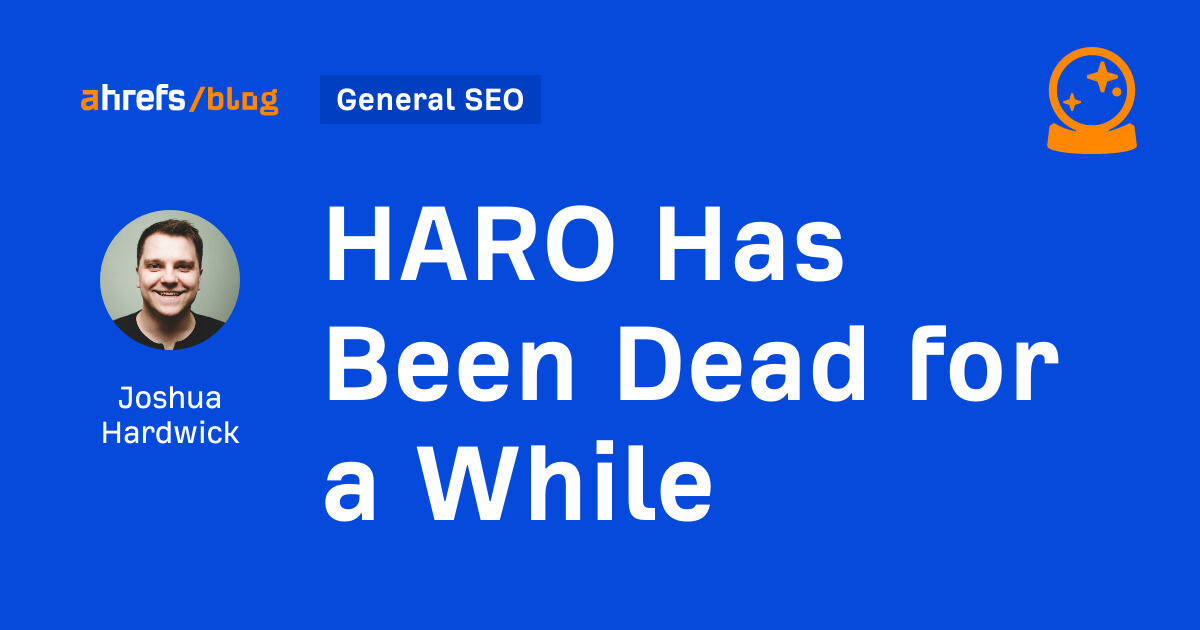
I know nothing about the new tool. I haven’t tried it. But after trying to use HARO recently, I can’t say I’m surprised or saddened by its death. It’s been a walking corpse for a while.
I used HARO way back in the day to build links. It worked. But a couple of months ago, I experienced the platform from the other side when I decided to try to source some “expert” insights for our posts.
After just a few minutes of work, I got hundreds of pitches:
So, I grabbed a cup of coffee and began to work through them. It didn’t take long before I lost the will to live. Every other pitch seemed like nothing more than lazy AI-generated nonsense from someone who definitely wasn’t an expert.
Here’s one of them:
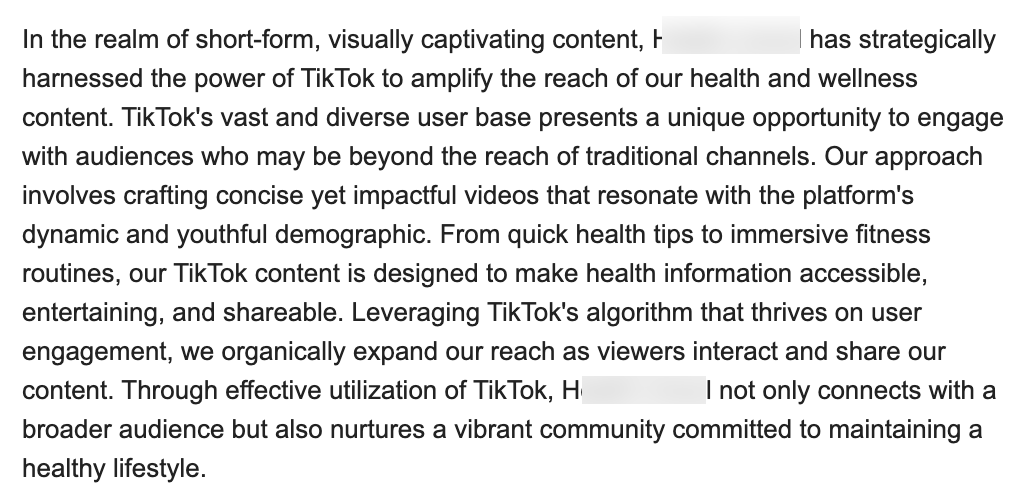

Seriously. Who writes like that? I’m a self-confessed dullard (any fellow Dull Men’s Club members here?), and even I’m not that dull…
I don’t think I looked through more than 30-40 of the responses. I just couldn’t bring myself to do it. It felt like having a conversation with ChatGPT… and not a very good one!
Despite only reviewing a few dozen of the many pitches I received, one stood out to me:


Believe it or not, this response came from a past client of mine who runs an SEO agency in the UK. Given how knowledgeable and experienced he is (he actually taught me a lot about SEO back in the day when I used to hassle him with questions on Skype), this pitch rang alarm bells for two reasons:
- I truly doubt he spends his time replying to HARO queries
- I know for a fact he’s no fan of Neil Patel (sorry, Neil, but I’m sure you’re aware of your reputation at this point!)
So… I decided to confront him 😉
Here’s what he said:
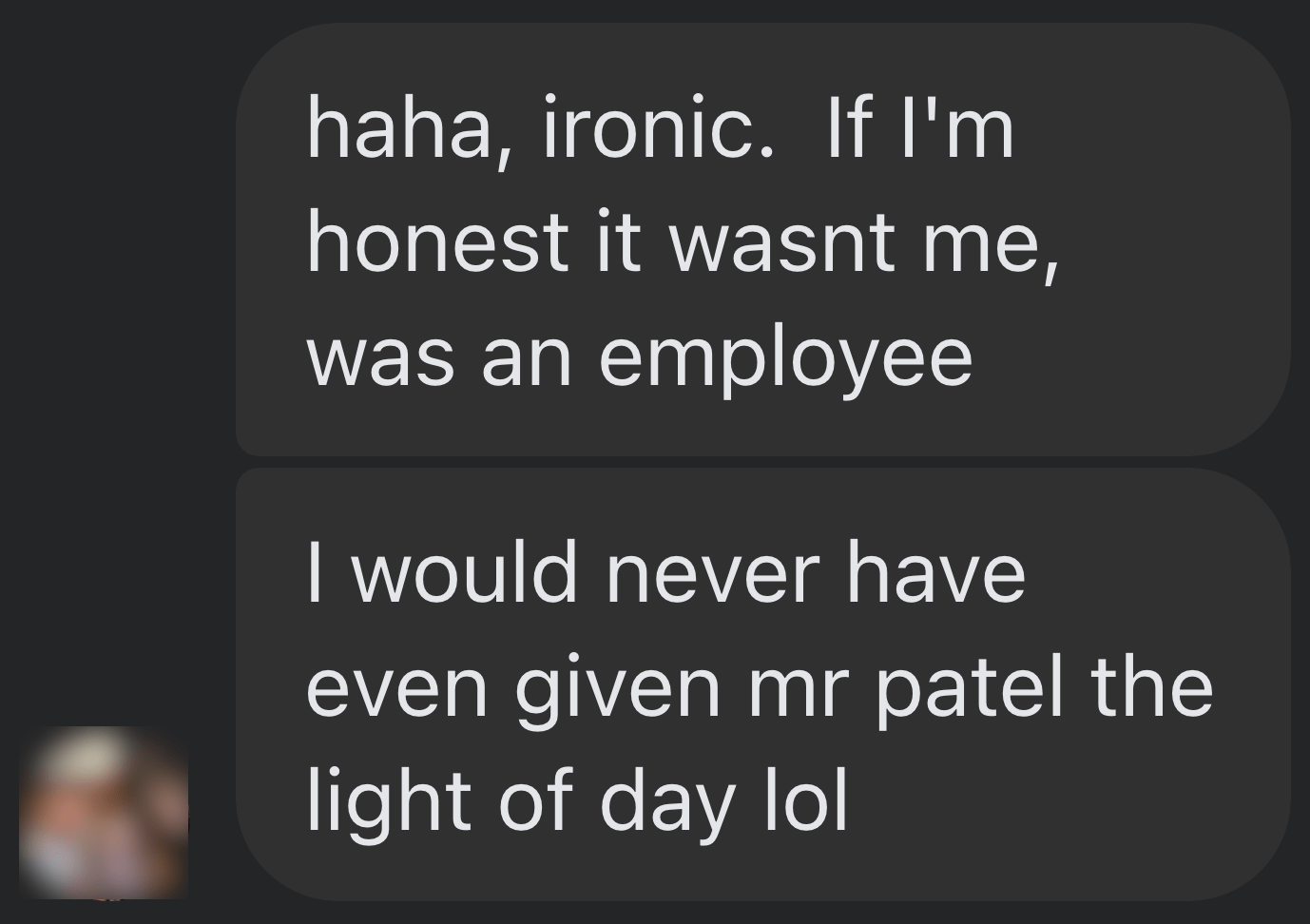

Shocker.
I pressed him for more details:
I’m getting a really good deal and paying per link rather than the typical £xxxx per month for X number of pitches. […] The responses as you’ve seen are not ideal but that’s a risk I’m prepared to take as realistically I dont have the time to do it myself. He’s not native english, but I have had to have a word with him a few times about clearly using AI. On the low cost ones I don’t care but on authority sites it needs to be more refined.
I think this pretty much sums up the state of HARO before its death. Most “pitches” were just AI answers from SEOs trying to build links for their clients.
Don’t get me wrong. I’m not throwing shade here. I know that good links are hard to come by, so you have to do what works. And the reality is that HARO did work. Just look at the example below. You can tell from the anchor and surrounding text in Ahrefs that these links were almost certainly built with HARO:
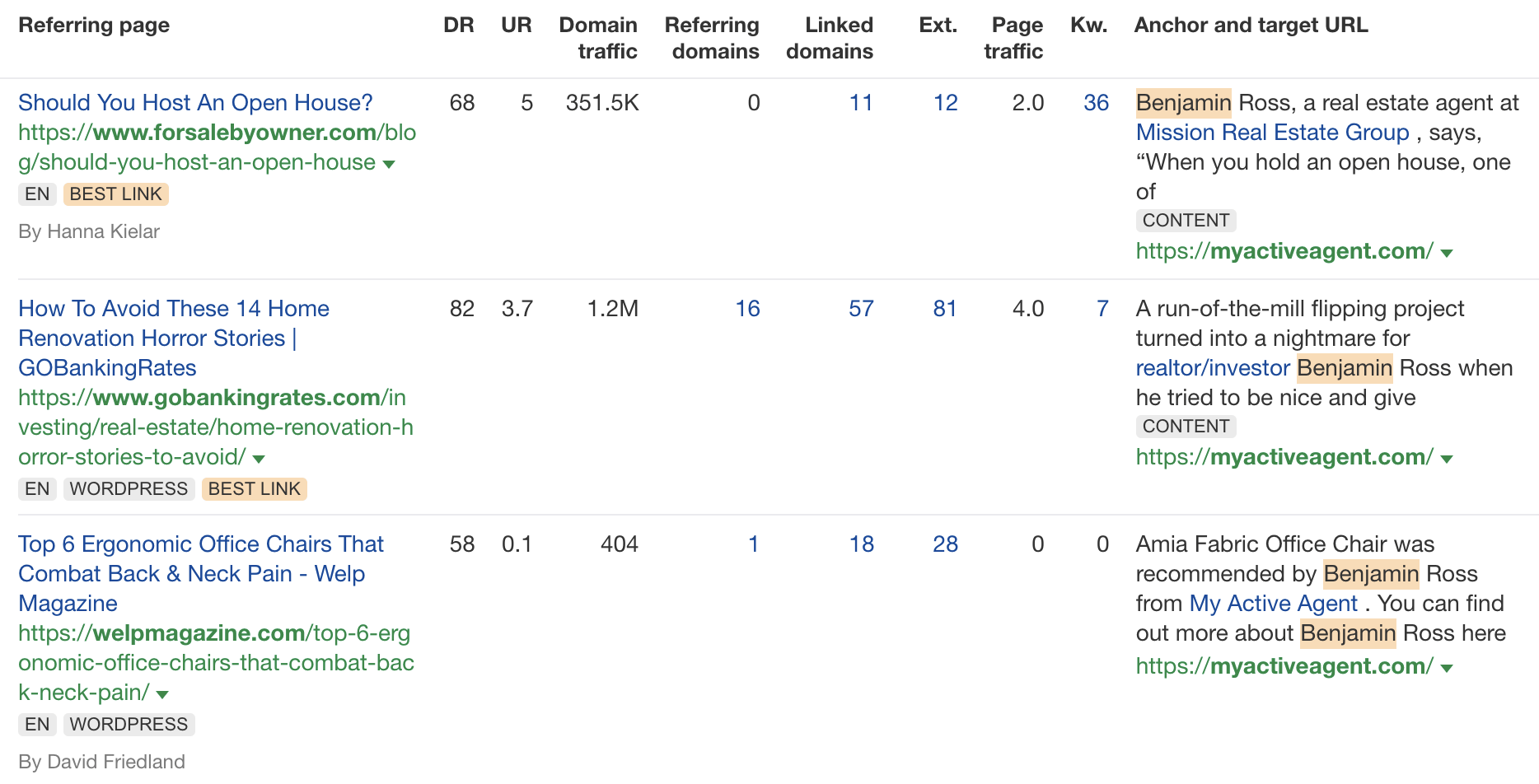

But this was the problem. HARO worked so well back in the day that it was only a matter of time before spammers and the #scale crew ruined it for everyone. That’s what happened, and now HARO is no more. So…
If you’re a link builder, I think it’s time to admit that HARO link building is dead and move on.
No tactic works well forever. It’s the law of sh**ty clickthroughs. This is why you don’t see SEOs having huge success with tactics like broken link building anymore. They’ve moved on to more innovative tactics or, dare I say it, are just buying links.
Sidenote.
Talking of buying links, here’s something to ponder: if Connectively charges for pitches, are links built through those pitches technically paid? If so, do they violate Google’s spam policies? It’s a murky old world this SEO lark, eh?
If you’re a journalist, Connectively might be worth a shot. But with experts being charged for pitches, you probably won’t get as many responses. That might be a good thing. You might get less spam. Or you might just get spammed by SEOs with deep pockets. The jury’s out for now.
My advice? Look for alternative methods like finding and reaching out to experts directly. You can easily use tools like Content Explorer to find folks who’ve written lots of content about the topic and are likely to be experts.
For example, if you look for content with “backlinks” in the title and go to the Authors tab, you might see a familiar name. 😉
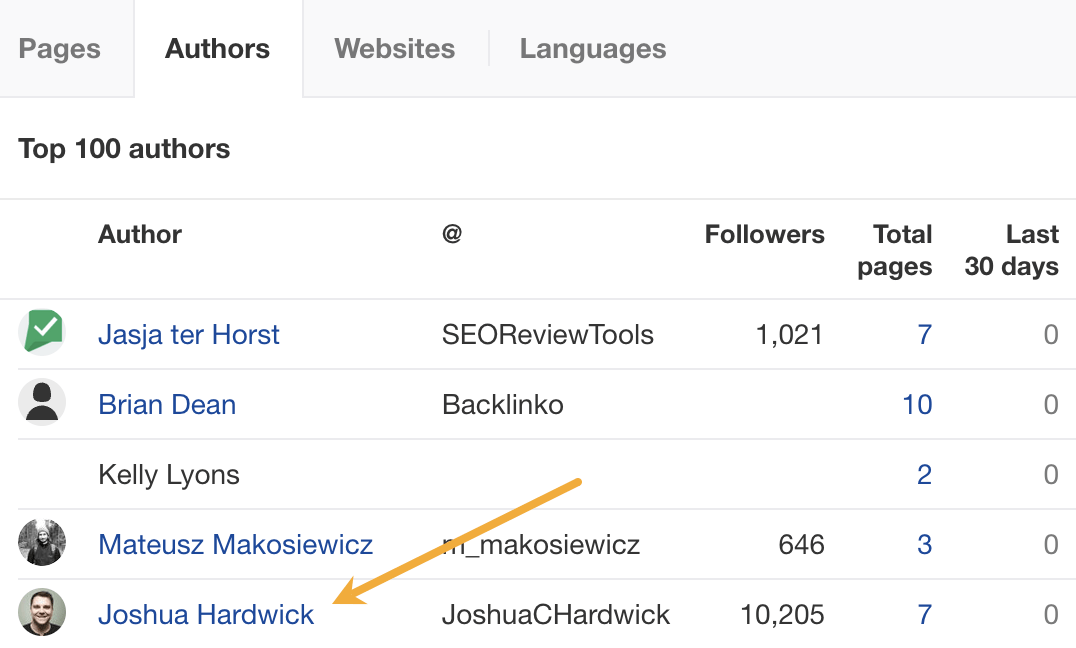

I don’t know if I’d call myself an expert, but I’d be happy to give you a quote if you reached out on social media or emailed me (here’s how to find my email address).
Alternatively, you can bait your audience into giving you their insights on social media. I did this recently with a poll on X and included many of the responses in my guide to toxic backlinks.
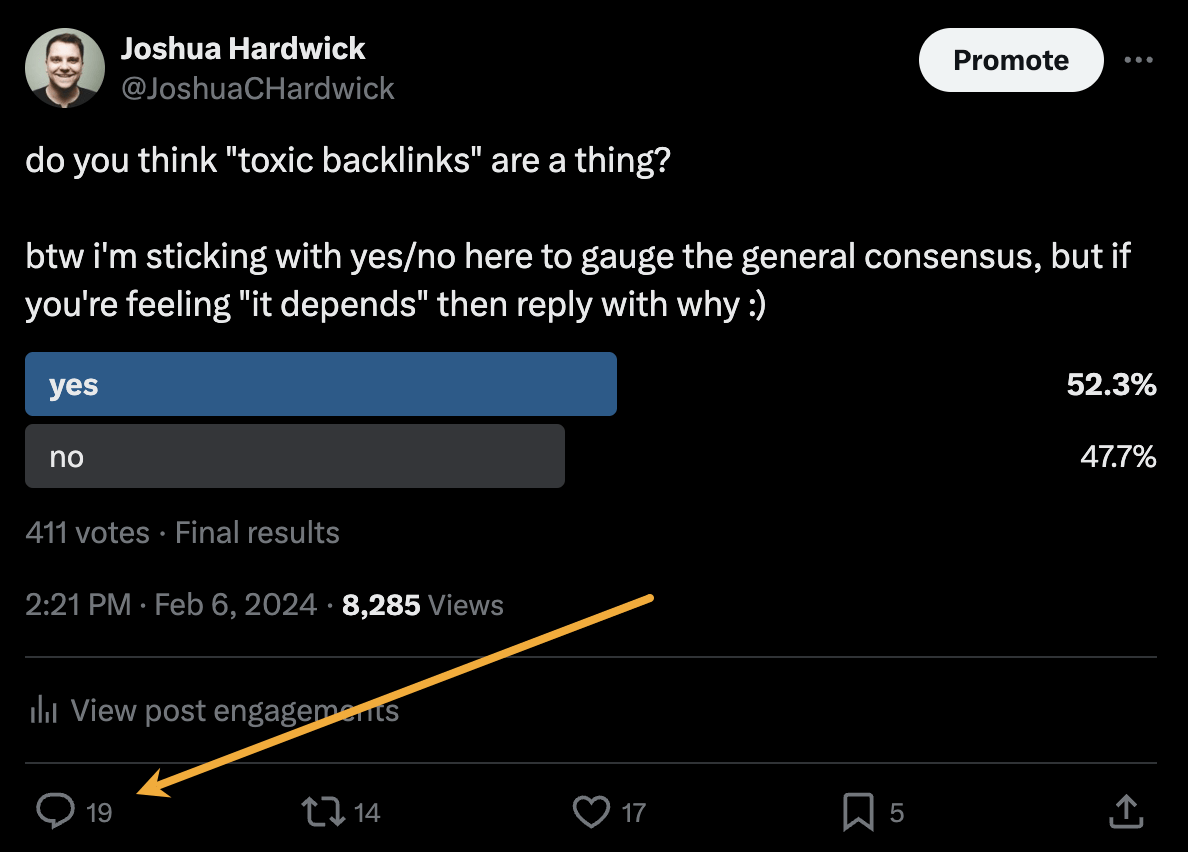

Either of these options is quicker than using HARO because you don’t have to sift through hundreds of responses looking for a needle in a haystack. If you disagree with me and still love HARO, feel free to tell me why on X 😉
SEO
Google Clarifies Vacation Rental Structured Data

Google’s structured data documentation for vacation rentals was recently updated to require more specific data in a change that is more of a clarification than it is a change in requirements. This change was made without any formal announcement or notation in the developer pages changelog.
Vacation Rentals Structured Data
These specific structured data types makes vacation rental information eligible for rich results that are specific to these kinds of rentals. However it’s not available to all websites. Vacation rental owners are required to be connected to a Google Technical Account Manager and have access to the Google Hotel Center platform.
VacationRental Structured Data Type Definitions
The primary changes were made to the structured data property type definitions where Google defines what the required and recommended property types are.
The changes to the documentation is in the section governing the Recommended properties and represents a clarification of the recommendations rather than a change in what Google requires.
The primary changes were made to the structured data type definitions where Google defines what the required and recommended property types are.
The changes to the documentation is in the section governing the Recommended properties and represents a clarification of the recommendations rather than a change in what Google requires.
Address Schema.org property
This is a subtle change but it’s important because it now represents a recommendation that requires more precise data.
This is what was recommended before:
“streetAddress”: “1600 Amphitheatre Pkwy.”
This is what it now recommends:
“streetAddress”: “1600 Amphitheatre Pkwy, Unit 6E”
Address Property Change Description
The most substantial change is to the description of what the “address” property is, becoming more descriptive and precise about what is recommended.
The description before the change:
PostalAddress
Information about the street address of the listing. Include all properties that apply to your country.
The description after the change:
PostalAddress
The full, physical location of the vacation rental.
Provide the street address, city, state or region, and postal code for the vacation rental. If applicable, provide the unit or apartment number.
Note that P.O. boxes or other mailing-only addresses are not considered full, physical addresses.
This is repeated in the section for address.streetAddress property
This is what it recommended before:
address.streetAddress Text
The full street address of your vacation listing.
And this is what it recommends now:
address.streetAddress Text
The full street address of your vacation listing, including the unit or apartment number if applicable.
Clarification And Not A Change
Although these updates don’t represent a change in Google’s guidance they are nonetheless important because they offer clearer guidance with less ambiguity as to what is recommended.
Read the updated structured data guidance:
Vacation rental (VacationRental) structured data
Featured Image by Shutterstock/New Africa
-

 WORDPRESS7 days ago
WORDPRESS7 days agoTurkish startup ikas attracts $20M for its e-commerce platform designed for small businesses
-

 MARKETING6 days ago
MARKETING6 days agoRoundel Media Studio: What to Expect From Target’s New Self-Service Platform
-

 SEO5 days ago
SEO5 days agoGoogle Limits News Links In California Over Proposed ‘Link Tax’ Law
-
SEARCHENGINES6 days ago
Daily Search Forum Recap: April 12, 2024
-

 MARKETING7 days ago
MARKETING7 days agoUnlocking the Power of AI Transcription for Enhanced Content Marketing Strategies
-

 SEARCHENGINES7 days ago
SEARCHENGINES7 days agoGoogle Search Results Can Be Harmful & Dangerous In Some Cases
-

 SEO4 days ago
SEO4 days ago10 Paid Search & PPC Planning Best Practices
-

 SEARCHENGINES5 days ago
SEARCHENGINES5 days agoGoogle Core Update Volatility, Helpful Content Update Gone, Dangerous Google Search Results & Google Ads Confusion





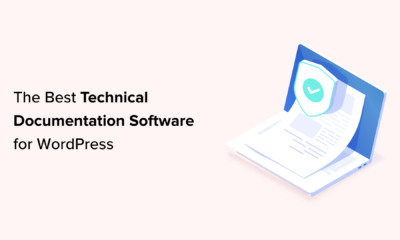







You must be logged in to post a comment Login